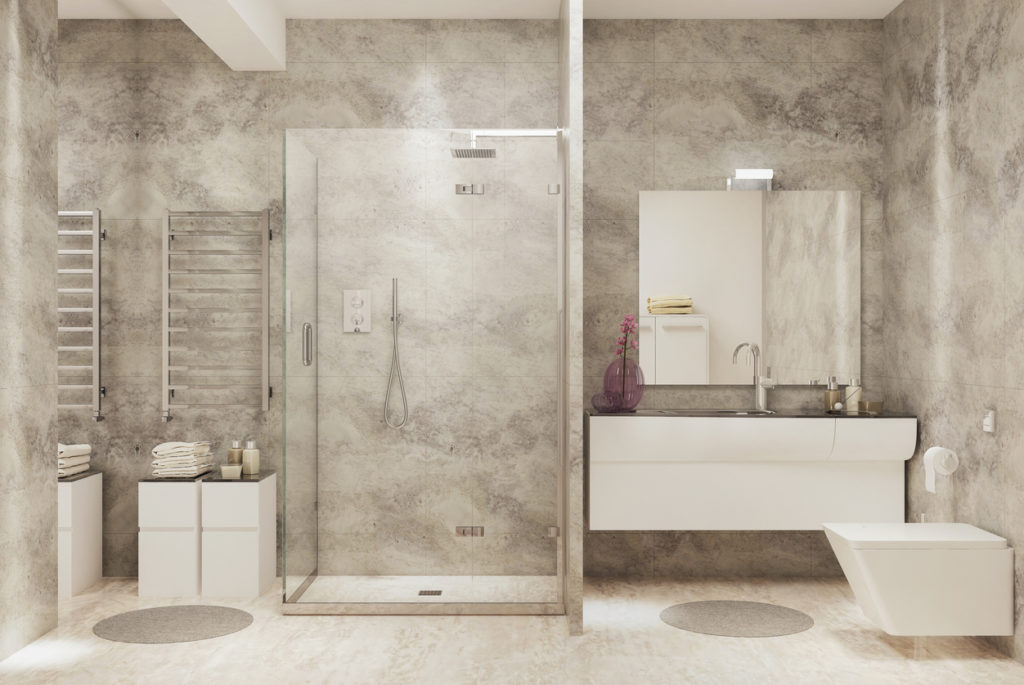How to create a sustainable bathroom
These days, every little helps when it comes to being eco-conscious. Whether that’s recycling, cutting down your water usage, or ditching the single-use items, we can all do more to make our home a bit more eco-friendly.
Can you guess which room has the biggest impact on your home’s sustainability. Well, the kitchen is a close contender, but it’s the bathroom that uses the most water, and so it’s up to you to support the environment with your home habits.
Here are a few things you can change in your bathroom, to make it more sustainable:
Low flow toilet and shower head
Toilets use around 27% of the water in your entire home - that's more than any other appliance, including the dishwasher and washing machine. If you live in a newer home, you might already be benefiting, but if not, you should consider a low-flow toilet.
These toilets provide ample flushing power but use just a fraction of the water. Some even come with a dual flush button, which allows you to use less water for liquid waste.
This same tip applies to your shower too! The average UK shower lasts around eight minutes and can use up to 60 litres of water. Converting to a low flow shower head may make you worry about the lack of pressure, but if you opt for an ‘aerating’ shower head, which works by mixing the restricted flow of water with air, you won’t even know the difference!
Using a low flow shower head will help you cut down on your water usage, but also positively impact your heating bills – doubling the benefits!
Bulbs
It’s no secret that choosing the wrong light bulb can increase your electric bill -, but unfortunately, it can also put a huge strain on the environment. As lighting can account for up to 15% of your electric usage, improving your bulb selection is a great way to improve your home’s sustainability.
Try LED bulbs, otherwise known as Light Emitting Diodes. They fit the majority of fittings, and are available in a range of colours, which means you can get that blue spa-like glow in your bathroom!
Although LEDs are slightly more expensive than traditional bulbs up front, the cost saving can be anything up to £35 a year.
Wall panels instead of paint
Adding a splash of colour to your bathroom walls seems like a good idea, however did you know, that paint produces up to 30 litres of toxic waste when created? Alongside this, the humidity of the bathroom means that your paint job will start to peel and discolour quickly, meaning you'll have to get the white overalls out year after year.
Our wet wall shower panels are the perfect alternative to paint. Our range of shower cladding is completely waterproof, which eliminates mould, therefore saving you time and money on your cleaning regime.
Our waterproof shower panels are also excellent at retaining heat. In the winter months, your bathroom can quickly get cold, which can lead to a higher use of radiators or underfloor heating. So, your heating bills will feel the benefit of our plastic wall cladding too.
Use eco-friendly products
Another quick and easy tip for creating an eco-friendly bathroom is swapping out your bathroom products for eco-friendly products.
Looking in shops for products like shampoo, soap and shower gel, which are kind to the environment is a small change to make yet can have a huge effect on your home’s sustainability.
Buy lifetime products
If you’re continually having to spend money to buy products on revamping, then your decorating approach is not very sustainable.
For example, if you were to replace your wall tiles, these would simply go into landfill, and would be extremely costly to replace.
Opting for ceiling cladding is a much more sustainable way to redecorate your bathroom. Not only do our PVC panels have a much cheaper initial cost than tiles, but they last much longer than alternative forms of wall options.
Alongside the cost benefit, our ceiling cladding is measured exactly, meaning that the left-over materials are significantly reduced. Once fitted with our PVC cladding trim, your bathroom will look clean and smart - who needs the professionals, eh?



























